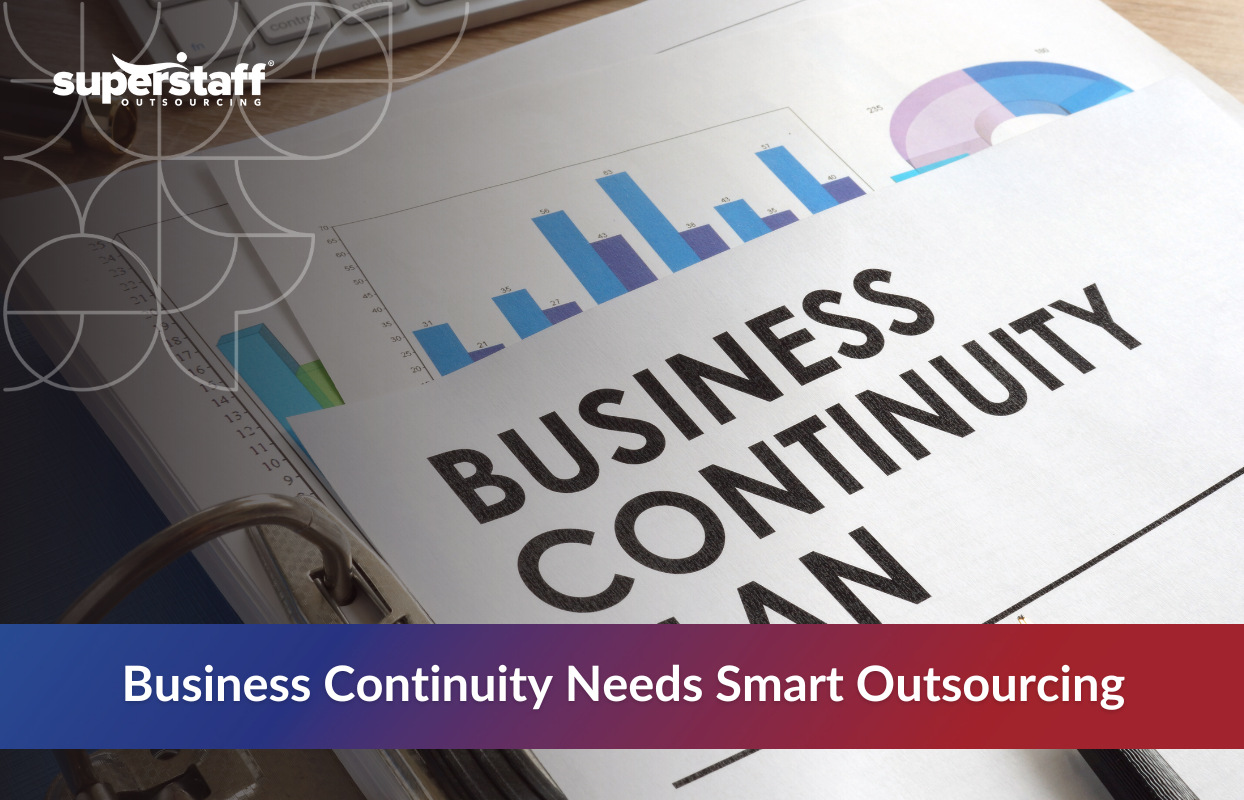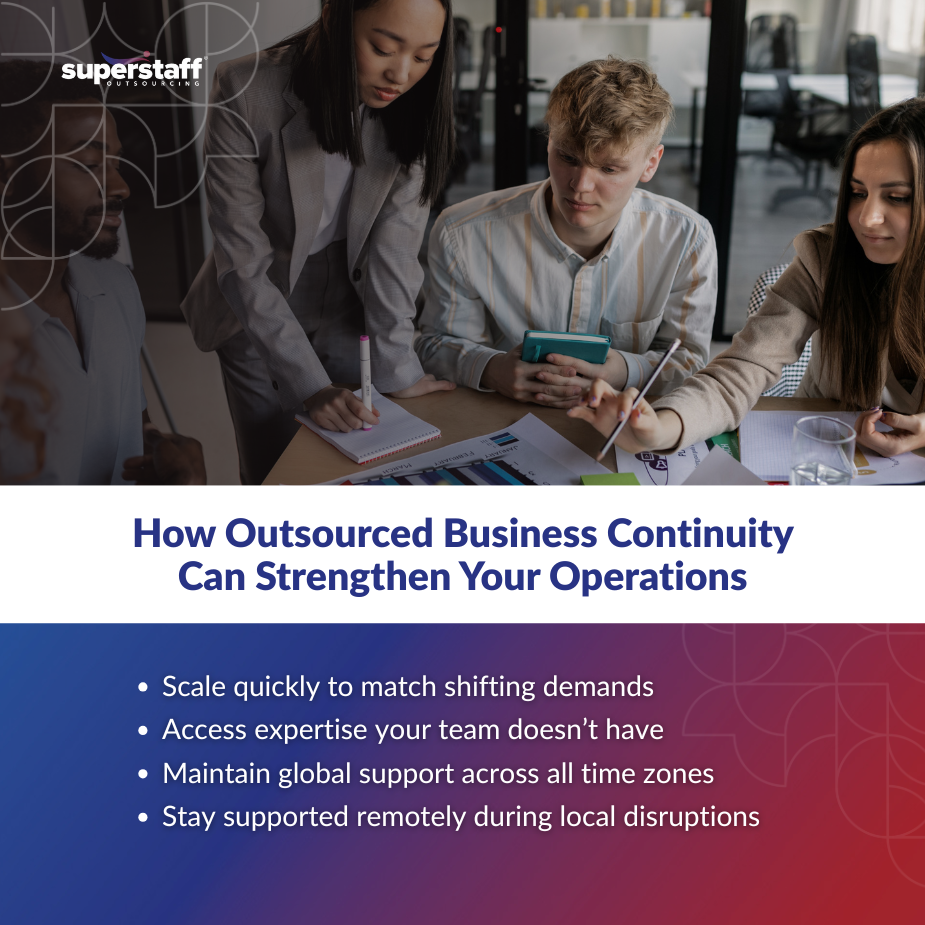
Disruptions in business are not a matter of “if,” but “when.” The speed at which a company can adapt and recover determines whether it will survive or struggle. Whether it’s an unexpected crisis or a sudden market shift, having the right plan in place is crucial. Outsourced business continuity can be the key to keeping your operations running when everything else seems to stop.
By adopting outsourced business continuity, you ensure that your business can continue to function smoothly even during the most challenging times.
In this article, we’ll explore how outsourced business continuity helps minimize downtime, improve resilience, and ensure your company remains on track, no matter the disruption.
The Importance of Business Continuity Planning
Every business faces risks, no matter its size or industry. Planning ahead makes it possible to keep vital operations running even when something goes wrong.
A good business continuity plan identifies critical functions, prepares backup systems, and sets clear steps for recovery. It also ensures that employees know their roles during a disruption, helping reduce confusion and panic.
Common threats to business operations include IT system failures, staffing shortages, and supply chain disruptions. 41% of businesses cite IT outages as a major cause of disruption, while 40% identify supply chain disruptions as the top risk to their operations. Without a strong plan, any of these can quickly escalate into long-term business damage.
Effective business continuity planning protects more than daily operations. It helps preserve customer trust, maintain consistent service delivery, and safeguard the company’s future growth.
With so many risks at play, having a reliable strategy to manage them is no longer optional — it’s essential.
How Outsourced Business Continuity Strengthens Your Plan

Outsourced business continuity gives companies a level of flexibility and strength that is hard to achieve alone. When disruptions occur, outsourcing partners can:
When disruptions occur, outsourcing partners can:
- Quickly scale operations to handle increased or decreased workloads.
- Provide specialized skills that may not be available within the company.
- Offer global support, ensuring service continues across time zones.
Outsourcing also allows businesses to:
- Move non-core tasks to reliable partners, so internal teams can focus on urgent matters.
- Rely on disaster recovery plans already built into the outsourcing provider’s service model.
- Maintain steady support through remote work setups, even when local offices are affected.
By leaning on outsourced business continuity during disruptions, companies can keep their operations stable and focused.
Benefits of Outsourcing for Business Continuity
Integrating outsourcing into your business continuity plan brings multiple advantages. These benefits are obvious when companies face unpredictable challenges.
First, outsourcing helps reduce downtime. External teams trained to step in quickly keep key functions moving without significant disruption. This is critical for maintaining customer satisfaction and avoiding financial losses during crises.
Cost efficiency is another major advantage. Instead of spending time and money hiring, training, and maintaining backup staff, companies can rely on external partners who are already prepared to deliver support.
Maintaining strong customer service becomes easier, too. Outsourced teams often specialize in client communication and technical support, ensuring that customers continue to receive prompt and helpful responses even when internal teams are experiencing challenges.
In short, outsourced business continuity offers:
- Flexibility to adjust staffing needs without long delays
- Access to technology and infrastructure without heavy investments
- A chance for internal teams to focus on critical recovery efforts instead of being stretched thin
Companies that build outsourcing into their planning stand a better chance of maintaining service quality and internal efficiency during difficult periods.
Using Outsourced Business Continuity as a Risk Mitigation Strategy
Every business decision involves some risk. Smart companies find ways to spread or minimize that risk, especially during disruptions. Outsourcing business continuity is one of the most effective ways to do this.
A report found that 63% of businesses that outsource continuity operations are more prepared for disruptions. By tapping into external expertise and technology, companies ensure faster recovery and smoother operations during crises. Outsourcing lets businesses stay focused on growth while reducing risk and downtime.
Outsourcing reduces risk by:
- Sharing responsibility for critical operations with external partners.
- Adding layers of protection through external compliance and cybersecurity experts.
- Maintaining emergency response teams who can act quickly during disruptions.
Remote workforce continuity solutions ensure that your business can maintain operations even when your in-house teams are unavailable. By leaning on outsourced business continuity during disruptions, companies can keep their operations stable and focused. Outsource risk management to ensure quick action and effective response during critical moments.
Managing Resources Effectively During Crises
Crises stretch internal teams thin. Managers and employees already balancing normal workloads may become overwhelmed. Outsourced business continuity helps companies keep performance strong without putting extra pressure on their internal teams.
By shifting non-essential tasks to trusted outsourcing partners, businesses can:
- Free internal staff to focus on critical recovery tasks.
- Keep projects and daily operations moving without delays.
- Scale services up or down as needed without long hiring or training delays.
Resource management benefits of outsourcing include:
- Faster recovery: Internal teams stay focused on important tasks, not overwhelmed by side duties.
- Higher productivity: Employees perform better when they are not overstretched.
- Better morale: Less burnout during crisis periods keeps teams motivated and engaged.
Businesses that use outsourced business continuity smartly can bounce back from crises faster and stronger than those that rely only on internal teams.
Outsourcing vs In-house BCP: Which is More Reliable?
When deciding how to handle business continuity, many companies wonder whether it’s better to keep it in-house or outsource it to a trusted partner. Both options have benefits, but outsourced business continuity often provides key advantages.
Managing business continuity in-house gives more control, but it can also be expensive and require a lot of resources. It’s harder to scale, and without the right expertise, responding to disruptions quickly can be a challenge. On the other hand, outsourcing allows you to tap into specialized skills without the high costs, ensuring that your operations continue smoothly during crises.
Outsourcing also offers remote workforce continuity solutions that help keep your team working, no matter the situation. With outsourced business continuity, you can rely on experts who are ready to act fast, helping your business stay resilient even when disruptions hit.
Choosing the Right Outsourcing Partner for Business Continuity
Not every outsourcing provider is equipped to handle the demands of crisis support. Choosing the right partner is crucial for building a reliable business continuity strategy.
When evaluating potential outsourcing partners, companies should look for providers with proven experience managing operations during disruptions. Flexibility and scalability are key traits, as is the ability to maintain clear and open communication at all times.
Reliability matters most. The outsourcing partner should demonstrate a history of delivering consistent service even under pressure. It’s important to review service level agreements carefully and ensure they include detailed commitments for disaster recovery and continuity support.
Alignment is equally important. A good outsourcing partner will take the time to understand your business priorities and design their services to fit your specific needs.
Choosing wisely ensures that when disruptions occur, your outsourcing partner is ready to act as a true ally, not just a vendor.
Making Outsourcing a Core Part of Your Continuity Strategy
Outsourced business continuity strengthens business continuity plans by providing flexibility, expertise, and risk management support. It helps companies reduce downtime, maintain customer satisfaction, and manage crises without overwhelming internal resources.
By working with the right outsourcing partner, businesses gain a strong advantage in responding to disruptions and protecting long-term growth.
Ready to build a stronger, more resilient business? Partner with SuperStaff to access reliable outsourcing solutions that help keep your operations moving, no matter what challenges come your way.






